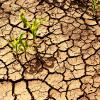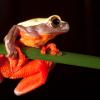
Full video now available! Piero Visconti, IIASA Biodiversity, Ecology, and Conservation Research Group Leader and IIASA Economic Frontiers Program Director, Michael Kuhn in conversation with George Monbiot.
Monbiot is a British writer known for his environmental and political activism. He writes a weekly column for The Guardian and is the author of several best-selling books.
His most recent book, Regenesis Feeding the World Without Devouring the Planet, took him on a journey of reviewing thousands of research articles, reports, books, and other forms of scientific evidence, which he synthesized through discussions with farmers, consumers, and other stakeholders to identify systemic problems in food systems, its social and environmental impacts, and possible transformational solutions.
News

25 April 2024
Climate change could become the main driver of biodiversity decline by mid-century

17 November 2023
Prioritizing land to avoid species extinction
02 November 2023

